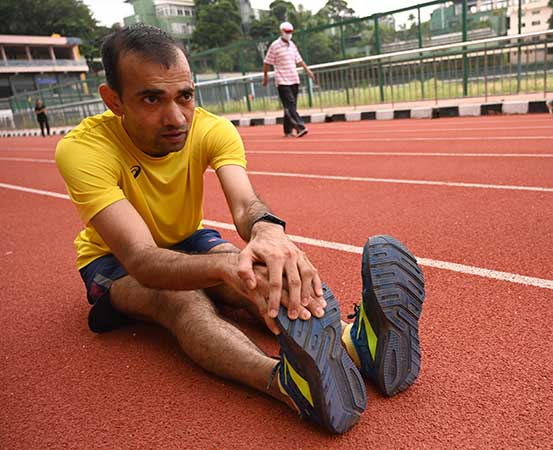
Running is loved by many as it provides an efficient and fun means to keep fit, devoid of the complexities and expenses of working out in a gym. All one needs is a comfortable pair of running shoes and a training schedule. The rest is a fulfilling journey, with varying distances (5K, 10K or marathons) providing a runner’s high – a short-lasting feeling of euphoria or bliss. Everything seems perfect till the muscle starts cramping out of the blue, a kilometre or so into what would have been a beautiful outing.
Muscle cramps can strike anyone during a run, from novices to even professional marathoners. They are caused by multiple factors that the runner encounters during physical exertion. A systematic training schedule (which ensures proper muscle conditioning) and sticking to the basics can keep those irritating muscle cramps away.
What causes muscle cramps while running?
Muscle cramps, which refer to sudden involuntary contraction of the muscles, can be caused by different factors. From the amount of water consumed before or during the run to the pre- and post-run routines and nutrition, everything plays a part in the optimal functioning of muscles.
The pace of the run, especially during the initial stage, can be a factor too. A study published in the British Journal of Sports Medicine concluded that the possibility of ‘exercise associated muscle cramping’ in distance runners was higher among those with a history of the same. In addition, running fast during the early stages of a race as well as pre-race muscle damage (minor injuries) can also cause muscle cramps.
“One of the main reasons for muscle cramps in runners is dehydration,” says Hitendra Choudhary, a marathon and fitness coach from Pune. “By dehydration, I mean drinking insufficient water not only during a run, but also on a regular basis. Inadequate hydration causes a shortage of water in the cells. Another aspect is the loss of electrolytes. When a person sweats, electrolytes are lost from the body, and failure to restore them can give rise to cramps.”
He also elaborates on the connection between diet and muscle cramps. Vegetarians or vegans receive insufficient vitamin B12 from their diet. This can cause a deficiency of the same and lead to muscle cramps.
“If one’s body lacks vitamin B12, and they are not receiving it from the diet, it is advisable to take supplements [as prescribed by a doctor] to restore the vitamin that gets drained from the body while running,” explains Choudhary.
Adequate rest is vital
“Runners often don’t take adequate rest after long runs,” says Choudhary. “Nowadays, we see challenges where a runner runs long distances over the course of 100 days. This is detrimental, as overuse of the muscles can also cause muscle cramps. Experts around the world suggest running three days a week (at max four) while using the remaining days for strength training and rest. In addition, runners often want to take part in as many races as possible, which is not wise. They must pick and choose, ensuring proper rest and recovery between races,” he explains.
Proper warm-up and cool-down stretches help avoid muscle cramps and other running-related injuries. “If cramps hit during a run, take a break,” advises Choudhary. “Stretch the muscles to release the cramp and restart only after it is resolved.
Restoring salt imbalance and reducing training intensity
Praveen Sharma, a marathon runner from Delhi, has been running long distances since 2013. He had never suffered a cramp over the years until early 2023, when his legs cramped up during the Delhi Marathon, around 300 metres to the finish line.
“I managed to avoid a muscle cramp for a long time until this year,” says Sharma, assuming that a salt imbalance might have caused it. “Cramps usually occur in the calf muscles and, in some cases, the quadriceps muscles as well. During long runs, it is important that the loss of water and salt in the body is addressed appropriately.”
He adds, “In the initial days, I used to carry small packets of salt or electrolytes with me. Nowadays, salt capsules are also available in the market. It’s important to drink water after consuming such capsules. Runners can also consume electrolytes the day before a long run or a big race.”
Runners should taper down their training a week or so before a big race or marathon to provide adequate rest to the muscles. They should limit their physical activity, running time and training intensity, while avoiding a state of complete rest.
Takeaways
- Muscle cramps while running can occur due to several factors, including dehydration, pace of the run (during the initial stage) and nutrient deficiency.
- Adequate hydration and consumption of electrolytes before and during a run can help prevent muscle cramps. In addition, sufficient rest combined with a proper warm-up and cool-down routine is also vital to avoid cramps and other running-related injuries.
- Runners should reduce their training volume and intensity a week or so before a big race or marathon to provide adequate rest to the muscles.


















One Response
Indeed a good read.